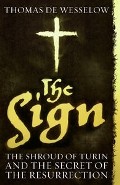By Thomas de Wesselow
Published by Viking Major new work explains the birth of Christianity for the first time
Major new work explains the birth of Christianity for the first time
A major new work of history, written by Cambridge art historian Thomas de Wesselow and published globally this week, explains the birth of Christianity for the first time.
The birth of Christianity, nearly 2000 years ago, shaped the course of human history, yet until now historians have been unable to explain how it all began. Now, the author of The Sign puts all the pieces of the puzzle together and presents a radical and convincing answer.
The key to one of the greatest mysteries of all time lies within the Shroud of Turin
Christianity began when, after Jesus’ crucifixion, Jesus’ followers claimed to have seen him alive again. De Wesselow shows that this episode can only be understood if what they actually saw was something real but out of the ordinary, something so extraordinary that they interpreted it as a sign of resurrection. What they saw was the Shroud.
Based on seven years of meticulous research, ‘The Sign’ proves that the Shroud of Turin is authentic
Long assumed to be a Medieval fake, the author provides conclusive evidence that The Shroud of Turin, the reputed burial cloth of Jesus, is in fact authentic. Using his experience as an art historian, the author proves that the image on the Shroud cannot possibly be a Medieval fake: the image does not match the style, technique or concepts of medieval imagery; it cannot be a painting or a rubbing; and, most crucially, it is a negative image, a fact only realized when it was first photographed in 1898.
The author’s revolutionary findings have been kept secret until today
The subject matter of this new book is so sensitive and so controversial that its contents have been kept a tight secret for seven years.
Using all his skills as an art historian, Thomas de Wesselow unlocks the secret of the Resurrection
Thomas de Wesselow explains that 2000 years ago people instinctively saw images as quasi-living beings – an instinct known as ‘animism’ – so the Shroud would have been seen by Mary Magdalene and the disciples as a living double of Jesus appearing after his death. In other words, it would have been seen as the resurrected Jesus, as a ‘sign’ revealing Jesus to have been raised from the dead and exalted to heaven.
‘The Sign’ exposes the flaws in the 1988 carbon-dating test which claimed the Shroud was from the Medieval period
This new book reveals how the botched sampling of the cloth and the last-minute abandonment of agreed procedures mean that the carbon-dating test was seriously flawed. De Wesselow shows that the carbon-dating of ancient cloths is particularly error-prone and explains how contamination or a medieval repair can account for the erroneous Shroud test.
Author details scientific tests that help prove that the Shroud is genuine
Like a detective, Thomas de Wesselow has drawn together a range of scientific evidence that helps prove that The Shroud must be authentic: pollens lifted from cloth fibres indicate that it was once in Israel; a seam used in the weave of the linen is identical to one found only on a first-century cloth from Judea; the wound-marks are composed of real blood; and an alternative, peer-reviewed test of the age of the linen found that it was over 1300 years old.
The Shround image is explained as a natural chemical stain
The author shows how the Shroud’s famous image of a crucified man could have been formed ‘naturally’ when chemicals from Jesus’ decomposing body reacted with starch deposits on the linen fabric to produce a unique stain.
The mystery of the early sightings of the risen Jesus can now be explained
The author shows how, viewed as an animistic image, the Shroud can explain all the early reports of the ‘appearances’ of the Risen Christ. The negative quality of the image also explains why, in the Gospels, the disciples are at first unable to recognize the Risen Jesus.
The Shroud matches the earliest testimony to the Resurrection
St Paulsays that the Risen Jesus appeared in a ‘spiritual body’ to many people, including a crowd of more than 500. Smuggled out ofJerusalem, The Shroud effectively went ‘on tour’ for many months before being whisked away to safety – and obscurity – in the Mesopotamia city ofEdessa. In its absence the belief in Jesus’ bodily resurrection gradually took hold.
Book finally explains why Christianity took off so quickly and so decisively after Jesus’ death
The new faith was kick-started by a real, observable phenomenon, seen by hundreds of consistent, credible eye-witnesses and interpreted as a sign of resurrection. The author shows how the Shroud itself holds the key to the mystery, and how it inspired the birth of Christianity.








Join the Discussion
Type out your comment here:
You must be logged in to post a comment.